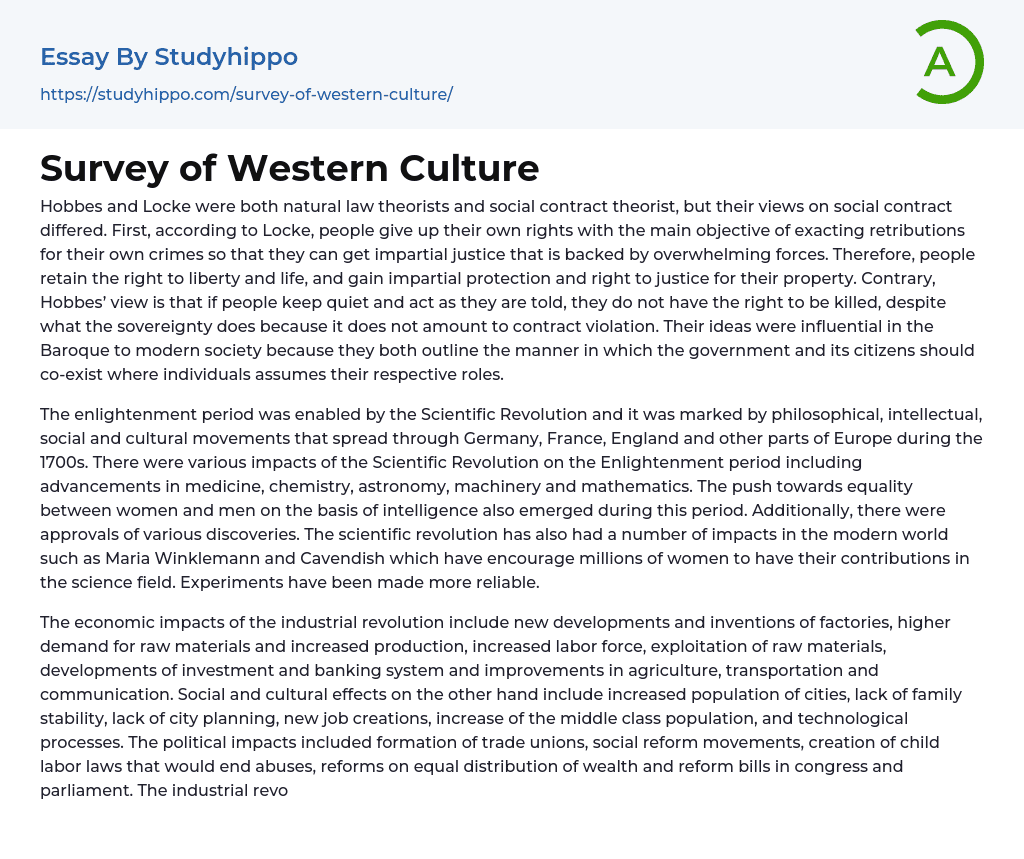Hobbes and Locke were both natural law theorists and social contract theorist, but their views on social contract differed. First, according to Locke, people give up their own rights with the main objective of exacting retributions for their own crimes so that they can get impartial justice that is backed by overwhelming forces. Therefore, people retain the right to liberty and life, and gain impartial protection and right to justice for their property. Contrary, Hobbes’ view is that if people keep quiet and act as they are told, they do not have the right to be killed, despite what the sovereignty does because it does not amount to contract violation. Their ideas were influential in the Baroque to modern society because they both outline the manner in which the government and its citizens should co-exist where individuals assumes their respective roles.
The enlightenment period was enable
...d by the Scientific Revolution and it was marked by philosophical, intellectual, social and cultural movements that spread through Germany, France, England and other parts of Europe during the 1700s. There were various impacts of the Scientific Revolution on the Enlightenment period including advancements in medicine, chemistry, astronomy, machinery and mathematics. The push towards equality between women and men on the basis of intelligence also emerged during this period. Additionally, there were approvals of various discoveries. The scientific revolution has also had a number of impacts in the modern world such as Maria Winklemann and Cavendish which have encourage millions of women to have their contributions in the science field. Experiments have been made more reliable.
The economic impacts of the industrial revolution include new developments and inventions of factories, higher demand
for raw materials and increased production, increased labor force, exploitation of raw materials, developments of investment and banking system and improvements in agriculture, transportation and communication. Social and cultural effects on the other hand include increased population of cities, lack of family stability, lack of city planning, new job creations, increase of the middle class population, and technological processes. The political impacts included formation of trade unions, social reform movements, creation of child labor laws that would end abuses, reforms on equal distribution of wealth and reform bills in congress and parliament. The industrial revolution had both negative and positive impacts, some of the negative effects include poor working conditions for laborers, child labor and women were made to work in factories while the positive elements incorporated construction of modern buildings, modern inventions and there was change in the structure of class.
John Keats was a poet in the Romantic period and he helped in the development of Romanticism ideas. Every aspect in Keats’ work is romantic and there are elements in his work of poetry that brings out the idea of Romanticism as evidenced in interest in the lyrics, interest in the transcendence that goes beyond human understanding, interests in romanticized and glorified past as well as the aspects of imagination. Alternatively, Alexander Pushkin, a Russian poet, tried to analyze and bring light to the main reasons of the Romantic idea which was basically a discontent of self and society.
Modernism is a philosophical movement that was marked with various changes and trends that had far-reaching transformations in the Western society in the late 19th and early 20th century. This period was marked with political, social
and cultural factors. The political factors include freedom, equality and belief in progress that sustained intellectuals. The social and cultural aspects were mainly marked with the concept of “modernity”. The modern ideas were expressed by the ability to address people from all the spheres of the society.
- Ben jonson essays
- Billy elliot essays
- Dred Scott essays
- Frederick Douglass essays
- Geert Hofstede essays
- George Eliot essays
- Ginevra King essays
- Harriet Tubman essays
- John Keats essays
- John Proctor essays
- Joseph Stalin essays
- Mahatma Gandhi essays
- Napoleon essays
- Robert E Lee essays
- Rosa Parks essays
- Siegfried Sassoon essays
- Wilkie collins essays
- American Culture essays
- Car Culture essays
- Cultural Differences essays
- Culture Shock essays
- Different Cultures essays
- Indian Culture essays
- Mexican Culture essays
- Mormon essays
- Pop Culture essays
- Popular Culture essays
- Cuban Missile Crisis essays
- Fidel Castro essays
- French Revolution essays
- Han Dynasty essays
- Hiroshima essays
- Imperialism essays
- Jack The Ripper essays
- Mao Zedong essays
- Middle Ages essays
- Mongols essays
- Nelson Mandela essays
- Ottoman Empire essays
- Reformation essays
- Reign of Terror essays
- Renaissance essays
- Roaring Twenties essays
- Romanticism essays
- Samurai essays
- Scientific Revolution essays
- Soviet Union essays




